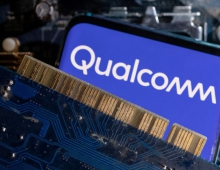
FTC trial: Qualcomm Defended Company's Licensing Policy and Mobile Chip Strengths
Irwin Jacobs, Qualcomm co-founder, on Tuesday defended the company's its licensing practices and oulined Qiualcomm's mobile chip prowess, during the trial against the US Federal Trade Commission.
Qualcomm and th FTC have been battling in a San Jose, California, courtroom since Jan. 4, and the FTC wrapped up its case against Qualcomm on Tuesday afternoon.
The FTC has accused Qualcomm of operating a monopoly in wireless chips, forcing customers like Apple to work with it exclusively and charging excessive licensing fees for its technology.
Jacobs said that Qualcomm decided to start licensing its technology to get enough funding to do more research and development on Code Division Multiple Access (CDMA).
Qualcomm initially developed three handset and two base station chips as well as its own handsets for the first networks in Hong Kong and South Korea. Back in 1995, “no one [else] had the confidence to build [CDMA] handsets,” Jacobs said.
The company also drafted text that formed the basis for a standard completed in July 1993.
The first licensee was AT&T, followed by Motorola, Nokia and others. Qualcomm charged an upfront fee and then royalties based on sales of CDMA devices.
"Everything was negotiated," Jacobs said. "We [wanted] something low enough that it did not impede progress should this become a commercial product. We wanted to see this used as broadly as possible worldwide."
Qualcomm holds most of the important patents related to CDMA, and the technology eventually enabled 3G networks that could also deliver data.
"The industry began to realize it was important to provide mobile internet access, data communications," Jacobs testified. "Essentially all third generation [network technology] is based on CDMA."
Carl Shapiro, a professor at the University of California in Berkeley and an expert witness for the FTC, testified Tuesday that while Qualcomm is an innovator, that doesn't mean it can't also be a monopoly.
"Qualcomm should be commended for its technological achievements," Shapiro said. "But ... what's really important is that companies who aren't quite as good or who don't have the scale are not impeded from trying to catch and threaten and challenge the leader."
He testified that Qualcomm is using its market power and its monopoly power over chips to extract an "unusually high amount" for royalties for patents. That raises the cost for rivals, weakens them as competitors and fortifies Qualcomm's monopoly power, Shapiro said.
Durga Malladi, Qualcomm senior vice president of 4G and 5G, stressed the patents and innovation Qualcomm has related to 3G, 4G and 5G mobile technology.
As of March 2018, Qualcomm was the only company capable of making a processor for millimeter wave 5G networks. The technology allows the superfast speeds of 5G but can travel only short distances and has trouble with impediments like trees or walls. Qualcomm has worked on technology to solve those problems for phones this year to run on millimeter wave networks from Verizon and AT&T.
"We are interested in moving the needle quite significantly when it comes to a lot of the communications problems we want to solve," Malladi said.
An FTC attorney showed Jacobs documents suggesting Qualcomm reduced CDMA royalties for China Unicom in exchange for an agreement to use its chips worldwide. He also showed an email from Jacobs to a Samsung executive promising a royalty reduction if the South Korean giant continued to purchase a set percentage of its WCDMA chips from Qualcomm.
“They were a good customer, purchasing a large percentage of chips from us and we wanted to encourage that,” said the 85-year-old Jacobs, who served as Qualcomm’s CEO until 2005 and retired from its board in 2012.
Monica Yang, an IP attorney for Taiwan’s Pegtron, testified via video that the company was “under huge time pressure” in 2007 to strike a CDMA2000 license with Qualcomm to win business making Apple iPhones.
“When I negotiated I knew you had to sign the [royalty agreement] to get the chip sets…We were in a position where we didn’t have much to bargain with,” Yang said.
Marvin Blecker, who retired in 2014 as vice president of licensing for Qualcomm, noted the company sometimes offered incentives to get OEMs to adopt 3G rather than WiMax, an Intel-backed alternative. In an email to him, one Qualcomm colleague suggested cutting off chip supply to one customer involved in a protracted patent negotiation.
Judge Lucy Koh will rule on the case after January 28 when attorneys for Qualcomm are expected to finish taking testimony.





















